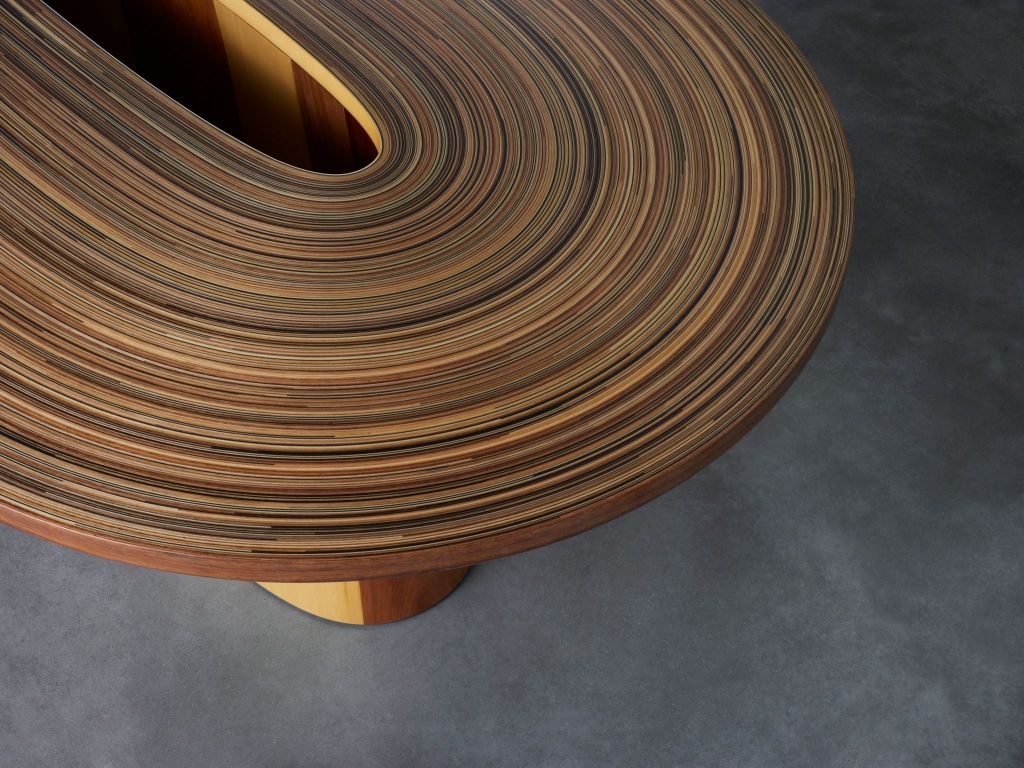
Emerging from the Depths – ReCoil by Brodie Neill
Through stunning practice of material manipulation, Brodie Neill’s ReCoil venerates the resourceful reclamation of Hydrowood timber from the forgotten depths of Tasmania’s Lake Pieman.
Tasmanian born and London based, Brodie’s upcycled dining table garnered abundant interest following its showcase at London Craft Week. With the support of the Tasmanian Government and Lark Distillery, the centrepiece’s exhibition was presented by Design Tasmania in collaboration with Hydrowood.
Harnessing the beauty of Tasmania’s inimitable natural resources, Brodie’s adept design champions a sustainable approach. “The world of waste is plentiful, with limitless potential to recycle. No longer do we need to sacrifice the environment in the harvesting of its natural resources,” he explains.
Skillfully crafted, ReCoil delivers a meticulous reformation of thinly sliced timber veneer offcuts. Reassembled by hand, each veneer wraps around the last, coiling to create concentric detailing that pays homage to a tree’s annual growth rings – both in form and the prolonged spell of time to produce. ReCoil’s scrupulous construction in Brodie’s North-East London studio encompasses three kilometres of timber veneer and over 60 hours of coiling alone.
A varied wealth of warm wood tones orbit the tabletop. Encircled by slivers of seven native Tasmanian tree species, the considered arrangement of Huon pine, Tasmanian oak, celery top pine, sassafras, myrtle and blackwood delivers a delightfully hypnotic quality to the piece. Preserved for centuries, the trees range from 100 to 200 year old Tasmanian oaks of oxidised burnt umber to 2000- year-old honey hued Huon pine.
A rich history is embedded in ReCoil’s sage materials, liberated from lakes by underwater logging company Hydrowood. Hydrowood’s untouched timber is salvaged after being submerged in the 1980’s by a hydroelectricity scheme on Tasmania’s west coast. The Pieman River region’s flooded forest serves as a precious treasure-trove for sustainably sourced Tasmanian timber.
ReCoil embodies an innovative approach to melding sophisticated design with sustainable, local industry.
While plunged below the water’s surface, the trees undergo a process of decay, releasing methane and carbon dioxide greenhouse gasses. Methane’s ability to trap heat in the atmosphere is 20 to 30 times more damaging than carbon dioxide. Combining advanced forestry techniques and reverence for environmental stewardship, Hydrowood’s retrieval of underwater trees interrupts this process by stabilising and harnessing the raw material for built applications.
ReCoil embodies an innovative approach to melding sophisticated design with sustainable, local industry. “It is the first of a series of projects for Design Tasmania that explore the opportunities for growth through partnerships between design, manufacturing and Tasmanian raw materials,” remarks Design Tasmania Chair Megan Perkins. The ReCoil collaboration superbly showcases Brodie’s mesmerising reimagination of reclaimed timber through celebration of Tasmanian materials and continuity of life cycles.































